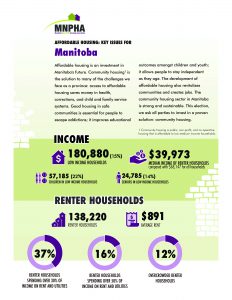 Affordable housing is an investment in Manitoba’s future. Community housing is the solution to many of the challenges we face as a province: access to affordable housing saves money in health, corrections, and child and family service systems. Good housing in safe communities is essential for people to escape addictions; it improves educational outcomes amongst children and youth; it allows people to stay independent as they age. The development of affordable housing also revitalizes communities and creates jobs. The community housing sector in Manitoba is strong and sustainable. This election, we ask all parties to invest in a proven solution: community housing.
Affordable housing is an investment in Manitoba’s future. Community housing is the solution to many of the challenges we face as a province: access to affordable housing saves money in health, corrections, and child and family service systems. Good housing in safe communities is essential for people to escape addictions; it improves educational outcomes amongst children and youth; it allows people to stay independent as they age. The development of affordable housing also revitalizes communities and creates jobs. The community housing sector in Manitoba is strong and sustainable. This election, we ask all parties to invest in a proven solution: community housing.
Download our fact sheet with our election asks and share it with your provincial candidates
Our asks include:
1. Maintain Affordability: With operating agreements ending, many non-profit providers will need ongoing support from government to provide housing at the deepest affordability levels. In the absence of this funding, rents will increase and low income people will need to leave their homes. This costs more in terms of health and well-being of individuals, families, and communities, than any short-term savings.
- We need to work together to plan how to best use the National Housing Strategy commitments to preserve housing for those in need, including long-term planning for rent subsidy agreements.
2. New Supply: Despite an increasing population, and increased demand for social and affordable housing, there has been no new supply of housing that is affordable to those living in poverty in the past three years.
- Reintroduce the Rental Housing Construction Tax Credit. This credit removes the PST from affordable, non-profit housing development, decreasing the costs of development by 7%, and giving the nonprofit sector leverage to access funding sources such as the National Housing Co-Investment Fund.
3. Supports in Housing: Tenants often live in community housing due to complex poverty, which includes experiences of homelessness, child welfare, health and mental health challenges, family violence, and migration to a new community. Community housing needs resources to support tenants to maintain their housing and be equipped to participate in education, employment, volunteering, and the community as a whole.
- Operating budgets should be allowed to include consistent funding for sufficient staffing to offer support and connection to resources as needed.
4. Capital Repairs and Maintenance: In 2009, a chronic shortfall in capital funding for social housing was estimated at $1b. While repair and maintenance funding increased for a period, it is declining again and housing is falling into disrepair.
- Increase capital investments to offer homes that provide dignity and a sense of self-worth to the families and individuals who live there.
5. Partner with Community: The non-profit housing sector is resilient and resourceful at providing stable, high-quality, affordable homes for Manitobans in need. The sector brings their equity, expertise, and networks that add value to the public investments. Non-profit ownership and management has been proven to be cost-effective, and provides good outcomes for tenants.
- The public investment, through sponsor-management agreements, rent supplement agreements, or other funding arrangements, needs to include increases in budgets tied to inflationary costs so the sector can keep up with increasing costs.

Recent Comments